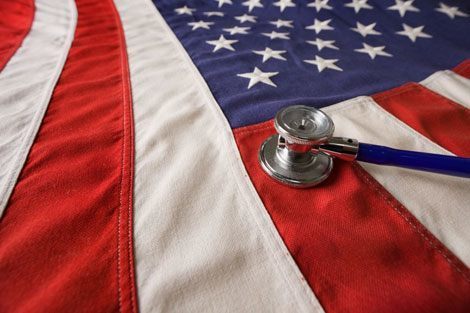Despite millions of Americans newly insured under ACA, most Americans still do not approve of the legislation
For immediate release: Wednesday, October 29, 2014
Boston, MA – A comprehensive analysis of data from 27 public opinion polls conducted by 14 organizations, including a poll in September of those most likely to vote, shows an electorate polarized by political party when it comes to the Affordable Care Act (ACA). A majority of Republican likely voters want the next Congress to repeal the law (56%), with an additional 27% favoring scaling it back. In contrast, a majority of Democratic voters want the new Congress to move ahead with the law (74%), either by implementing the current law (30%) or expanding its scope (44%). Independent likely voters fall in between, with 34% favoring repealing the law, 27% scaling it back, 8% implementing the current law, and 26% expanding it (Chart 1).
“The intensity of partisan feeling about the ACA in this election could make the next phase of its implementation a very contentious issue in the next Congress,” said Robert Blendon, professor of health policy and political analysis at Harvard School of Public Health and co-author of the analysis that appears as an online Special Report on October 29, 2014, in the New England Journal of Medicine.
The polling results not only show health care as the third-ranked issue in this election, but also portray a number of other striking findings. Despite millions of Americans who were uninsured now receiving coverage under the ACA, public approval of the ACA has not improved since it was enacted four years ago. Only a minority of Americans approve of either the ACA or President Obama’s handling of health care policy (Chart 2).
View the charts.
In addition, the polling analysis shows that there has been a cultural shift among many Americans toward a key principle behind the ACA. In 2007, during the presidential primaries, public support for the view that the federal government has responsibility to make sure all Americans have health insurance coverage was at 64%. In 2014 this figure has declined to 47%, and it is even lower among likely voters (41%). Of importance for the election outcome, support for the principle of universal coverage was 70% among Democratic likely voters and 12% among Republicans.
“The polling results point clearly to why the election outcome will matter for the ACA,” said Blendon. “Democrats, were they to be in the majority in Congress, would reflect the views of their party’s voters in favor of moving ahead with the implementation of the law, with a high priority on achieving universal coverage. With Republicans in the majority, they would see repealing or scaling back the ACA as reflecting the views of their core voters. In addition, they would likely place a lower priority than Democrats on achieving universal coverage the upcoming congressional term.”
Citations for the individual polls are included in the article.
“Voters and the Affordable Care Act in the 2014 Election,” Robert J. Blendon, John M. Benson, NEJM, online October 29, 2014. DOI: 10.1056/NEJMsr1412118
This paper is part of a project supported by the Robert Wood Johnson Foundation called “The Public and America’s Health Agenda.” The views expressed in the article are those of the authors and do not necessarily reflect those of the Robert Wood Johnson Foundation.
For more information:
Marge Dwyer
mhdwyer@hsph.harvard.edu
617-432-8416
photo: iStockphotos.com
Harvard School of Public Health brings together dedicated experts from many disciplines to educate new generations of global health leaders and produce powerful ideas that improve the lives and health of people everywhere. As a community of leading scientists, educators, and students, we work together to take innovative ideas from the laboratory to people’s lives—not only making scientific breakthroughs, but also working to change individual behaviors, public policies, and health care practices. Each year, more than 400 faculty members at HSPH teach 1,000-plus full-time students from around the world and train thousands more through online and executive education courses. Founded in 1913 as the Harvard-MIT School of Health Officers, the School is recognized as America’s oldest professional training program in public health. For more information, visit www.hsph.harvard.edu.
